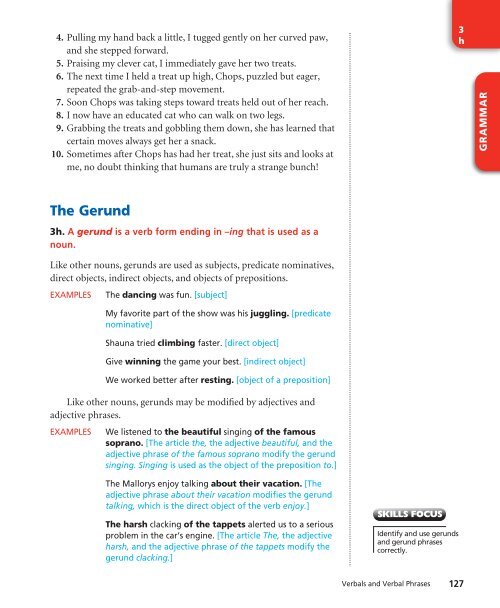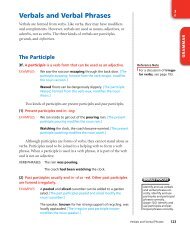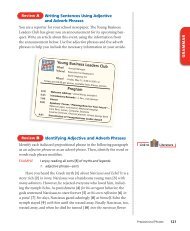Create successful ePaper yourself
Turn your PDF publications into a flip-book with our unique Google optimized e-Paper software.
4. Pulling my hand back a little,Itugged gently on her curved paw,<br />
and she stepped forward.<br />
5. Praising my clever cat,Iimmediately gave her two treats.<br />
6. <strong>The</strong> next time I held a treat up high, Chops, puzzled but eager,<br />
repeated the grab-and-step movement.<br />
7. Soon Chops was taking steps toward treats held out of.her reach.<br />
8. I now have an educated cat who can walk on two legs.<br />
9. Grabbing the treats and gobbling them down, she has learned that<br />
certain moves always get her a snack.<br />
10. Sometimes after Chops has had her treat, she just sits and looks at<br />
me, no doubt thinking that humans are truly a strange bunch!<br />
<strong>The</strong> <strong>Gerund</strong><br />
3h. A gerund is a verb form ending in –ing that is used as a<br />
noun.<br />
Like other nouns, gerunds are used as subjects, predicate nominatives,<br />
direct objects, indirect objects, and objects of prepositions.<br />
EXAMPLES <strong>The</strong> dancing was fun. [subject]<br />
My favorite part of the show was his juggling. [predicate<br />
nominative]<br />
Shauna tried climbing faster. [direct object]<br />
Give winning the game your best. [indirect object]<br />
We worked better after resting. [object of a preposition]<br />
Like other nouns, gerunds may be modified by adjectives and<br />
adjective phrases.<br />
EXAMPLES We listened to the beautiful singing of the famous<br />
soprano. [<strong>The</strong> article the, the adjective beautiful, and the<br />
adjective phrase of the famous soprano modify the gerund<br />
singing. Singing is used as the object of the preposition to.]<br />
<strong>The</strong> Mallorys enjoy talking about their vacation. [<strong>The</strong><br />
adjective phrase about their vacation modifies the gerund<br />
talking, which is the direct object of the verb enjoy.]<br />
<strong>The</strong> harsh clacking of the tappets alerted us to a serious<br />
problem in the car’s engine. [<strong>The</strong> article <strong>The</strong>, the adjective<br />
harsh, and the adjective phrase of the tappets modify the<br />
gerund clacking.]<br />
Identify and use gerunds<br />
and gerund phrases<br />
correctly.<br />
3<br />
h<br />
Verbals and Verbal <strong>Phrase</strong>s 127<br />
GRAMMAR
GRAMMAR<br />
128 Chapter 3 <strong>The</strong> <strong>Phrase</strong><br />
Like verbs, gerunds may also be modified by adverbs and adverb<br />
phrases.<br />
EXAMPLES Reading widely is one way to acquire judgment, maturity,<br />
and a good education. [<strong>The</strong> gerund Reading is the subject of<br />
the verb is. <strong>The</strong> adverb widely modifies the gerund Reading.]<br />
Floating lazily in the pool is my favorite summer pastime.<br />
[<strong>The</strong> gerund Floating is used as the subject of the sentence.<br />
It is modified by the adverb lazily (telling how) and also by<br />
the adverb phrase in the pool (telling where).]<br />
Brandywine likes galloping briskly on a cold morning.<br />
[<strong>The</strong> gerund galloping is the direct object of the verb likes.<br />
<strong>The</strong> adverb briskly (telling how) and the adverb phrase on a<br />
cold morning (telling when) both modify galloping.]<br />
<strong>Gerund</strong>s, like present participles, end in –ing. To be a gerund, a<br />
verbal must be used as a noun. In the following sentence, three words<br />
end in –ing, but only one of them is a gerund.<br />
EXAMPLE Circling the runway, the pilot was preparing for landing.<br />
[Circling is a present participle modifying pilot. Preparing is<br />
part of the verb phrase was preparing. Only landing, used as<br />
the object of the preposition for, is a gerund.]<br />
Exercise 7<br />
Identifying and Classifying <strong>Gerund</strong>s<br />
Identify each gerund in the following sentences. <strong>The</strong>n, write how each<br />
is used: as a subject, a predicate nominative, a direct object, or an object<br />
of a preposition.<br />
EXAMPLE 1. Instead of driving, let’s walk.<br />
1. driving—object of a preposition<br />
1. Her laughing attracted my attention.<br />
2. By studying, you can improve your grades.<br />
3. Why did the birds stop chirping?<br />
4. Writing in my journal has helped me understand myself better.<br />
5. Smiling, Dad said that we would all go to a movie when we had<br />
finished the cleaning.<br />
6. What Joseph liked best was hiking to the peak.<br />
7. Before leaving the beach, we sat and watched the fading light.<br />
8. Yesterday, Mrs. Jacobs was discussing having a garage sale.<br />
9. One of Alvin’s bad habits is boasting.<br />
10. Without knocking, the crying child threw open the door.
<strong>The</strong> <strong>Gerund</strong> <strong>Phrase</strong><br />
3i. A gerund phrase consists of a gerund and any modifiers or<br />
complements the gerund has. <strong>The</strong> entire phrase is used as a noun.<br />
EXAMPLES <strong>The</strong> gentle pattering of the rain was a welcome sound.<br />
[<strong>The</strong> gerund phrase is the subject of the sentence. <strong>The</strong><br />
gerund pattering is modified by the article <strong>The</strong>, the adjective<br />
gentle, and the prepositional phrase of the rain. Notice<br />
that the modifiers preceding the gerund are included in<br />
the gerund phrase.]<br />
I feared skiing down the mountain alone. [<strong>The</strong> gerund<br />
phrase is used as the object of the verb feared. <strong>The</strong> gerund<br />
skiing is modified by the prepositional phrase down the<br />
mountain and by the adverb alone.]<br />
My dog’s favorite game is bringing me the newspaper.<br />
[<strong>The</strong> gerund phrase is used as a predicate nominative. <strong>The</strong><br />
gerund bringing has a direct object, newspaper, and an<br />
indirect object, me.]<br />
Evelyn Ashford won a gold medal for running the<br />
100-meter dash. [<strong>The</strong> gerund phrase is the object of the<br />
preposition for. <strong>The</strong> gerund running has a direct object,<br />
dash.]<br />
Exercise 8 Identifying and Classifying <strong>Gerund</strong><br />
<strong>Phrase</strong>s<br />
Find the gerund phrases in the following sentences. <strong>The</strong>n, tell how<br />
each phrase is used: as a subject, a predicate nominative,a direct object,<br />
or an object of a preposition.<br />
EXAMPLE 1. My favorite hunting trophies are the ones I get by<br />
photographing wild animals.<br />
1. photographing wild animals—object of a preposition<br />
1. Exciting and challenging, wildlife photography is surprisingly<br />
similar to pursuing prey on a hunt.<br />
2. In both activities, knowing the animals’.habits.and habitats is vital<br />
to success.<br />
3. Scouting out locations is important to both the hunter and the<br />
nature photographer.<br />
4. This preparation gives you time for figuring out the best natural<br />
light for photography.<br />
HELP<br />
Sentences in<br />
Exercise 8 may contain<br />
more than one<br />
gerund phrase.<br />
3<br />
i<br />
A noun or a pronoun that<br />
comes before a gerund<br />
should be in the possessive<br />
form.<br />
EXAMPLES<br />
My playing the radio<br />
loudly is a bad habit.<br />
Ed’s constant TV watching<br />
interferes with our<br />
studying.<br />
Identify and use gerunds<br />
and gerund phrases<br />
correctly.<br />
Verbals and Verbal <strong>Phrase</strong>s 129<br />
GRAMMAR
GRAMMAR<br />
130 Chapter 3 <strong>The</strong> <strong>Phrase</strong><br />
5. Other important skills are being quiet and keeping your aim<br />
very steady.<br />
6. In photography, you must also consider choosing the correct film.<br />
7. Photographers often like taking pictures of.animals feeding near<br />
ponds and rivers.<br />
8. Setting up a tripod and camera in underbrush nearby is a way to<br />
be ready when the animals come.<br />
9. Advance preparation often makes the difference between getting<br />
good pictures and getting great ones.<br />
10. Your patience and skill are rewarded when you “capture” a wild<br />
creature without killing it.<br />
Review E<br />
Identifying and Classifying <strong>Gerund</strong>s<br />
and <strong>Gerund</strong> <strong>Phrase</strong>s<br />
Identify the gerunds or gerund phrases in the following sentences.<br />
<strong>The</strong>n, tell how each is used: as a subject, a predicate nominative, a<br />
direct object, or an object of a preposition.<br />
EXAMPLE 1. Drawing a good caricature is hard to do.<br />
1. Drawing a good caricature—subject<br />
1. A caricature is a picture, usually of a person, that draws attention<br />
to key features by emphasizing them.<br />
2. Usually, caricature artists enjoy poking fun at famous people.<br />
3. Looking at caricatures is an entertaining way to capture the “feel”<br />
of a historical period.<br />
4. No one looking at this sketch of Teddy Roosevelt can help smiling.<br />
5. <strong>The</strong> artist began by simplifying the shape of.his subject’s head.<br />
6. <strong>The</strong>n he started outlining the temples and round cheeks with bold<br />
strokes of.his pen.<br />
7. As you probably realize, magnifying reality is very important to<br />
good caricature.<br />
8. By enlarging Roosevelt’s engaging grin and bristly mustache, the<br />
artist emphasizes these features and suggests Roosevelt’s energetic,<br />
outgoing personality.<br />
9. <strong>The</strong> artist also uses his subject’s narrowed eyes and oval glasses for<br />
comic effect by drawing them closer together than they really were.<br />
10. Exaggerating Roosevelt’s features has resulted in an amusing but<br />
unmistakable likeness.





